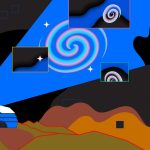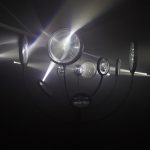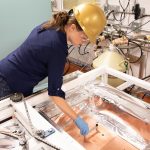From APS Physics, Oct. 20, 2020: The SENSEI dark matter detector provides world-leading sensitivity for distinguishing lightweight dark matter from background noise.
dark matter
Fermilab joins the global celebration of Dark Matter Day. Hear from Fermilab scientists during a special webinar on Saturday, Oct. 31, at 1 p.m. CT. Take a virtual tour of the lab’s dark matter experiments and detectors, and learn how Fermilab is helping answer questions about the mysterious stuff that makes up 25% of our universe.
From NIST, Oct. 13, 2020: Researchers at NIST and their colleagues, including Fermilab scientist Gordan Krnjaic, have proposed a novel method for finding dark matter. The experiment, in which a billion millimeter-sized pendulums would act as dark matter sensors, would be the first to hunt for dark matter solely through its gravitational interaction with visible matter. A three-minute animation illustrates the new technique.
Visualizing dark matter is not an easy task. Although scientists have reason to believe the mysterious substance makes up about 27% of all the matter and energy in the universe, they still have yet to see it directly; they know it exists only because of its gravitational pull on the visible matter around it. An art exhibit at the Science Gallery Dublin combines art and science to illuminate the invisible nature of dark matter.
From Science, Oct. 2, 2020: As U.S. particle physicists start to drum up new ideas for the next decade in a yearlong Snowmass process they have no single big project to push for (or against). Physicists have just started to build the current plan’s centerpiece: The Long-Baseline Neutrino Facility at Fermilab will shoot particles through 1,300 kilometers of rock to the Deep Underground Neutrino Experiment in South Dakota. Fermilab Deputy Director of Research Joe Lykken and Fermilab scientist Vladimir Shiltsev comment on other possible pursuits in high-energy physics.
From Página 12, Sept. 12, 2020: Recibió el reconocimiento “Nuevos Horizontes en Física 2021” en el marco de los premios Breakthrough. Se recibió en la UBA y desde hace años investiga en el Fermilab de Chicago, el laboratorio de física de partículas más importante de Estados Unidos.





